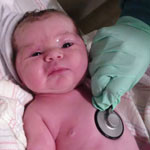Brachial Plexus Injury Lawsuit Alleges Series of Missteps Led to Birth Injuries
 A brachial plexus injury lawsuit has been filed by a mother who alleges her child’s injuries were a direct result of actions by medical staff in the delivery room. The mother is now seeking damages for her child’s ongoing injuries and need for medical treatment and monitoring.
A brachial plexus injury lawsuit has been filed by a mother who alleges her child’s injuries were a direct result of actions by medical staff in the delivery room. The mother is now seeking damages for her child’s ongoing injuries and need for medical treatment and monitoring.
Brachial plexus injury lawsuit filed in Illinois court
The lawsuit was filed in Cook County Circuit Court in Illinois on July 30, 2013. The plaintiff states in the complaint that she presented at the University of Illinois Medical Center at Chicago on April 18, 2006. Because she was diagnosed with preeclampsia, the plaintiff’s labor was induced at that time.
During the labor process, the plaintiff claims the medical staff at the hospital failed to perform a Cesarean delivery, despite the fact there were signs of diabetes and fetal macrosomia. Fetal macrosomia is a condition where the unborn child is exceptionally large, and often requires a Cesarean delivery to ensure the health and safety of the child.
During delivery, the baby experienced shoulder dystocia, in which one of the infant’s shoulders becomes lodged in the birth canal – often behind the mother’s pubic bone. The plaintiff states the medical staff improperly performed delivery maneuvers and applied excessive force while delivering the newborn, due to the shoulder dystocia.
Allegations state hospital staff actions led to multiple birth injuries
The actions of the medical staff resulted in a brachial plexus injury to the newborn, as well as a brain damage birth injury, according to the complaint. Brachial plexus injuries, which affect approximately two in every 1,000 births, occur when the brachial plexus nerve network is damaged. These nerves are responsible for controlling movement in the shoulder, arm and hand. When they are damaged, that limb may never function completely normally.
The brain damage suffered by the infant may be attributed to oxygen deprivation during the birth process, also known as fetal hypoxia. This condition is often the result of a prolonged labor and delivery, excessive Pitocin during labor induction or maternal problems such as preeclampsia and diabetes. All of these factors allegedly played a role during this childbirth.
Fetal hypoxia can lead to a variety of long-term injuries for the child, including cerebral palsy, brain damage and chronic heart and lung disease. These injuries can lead to financial hardship for a family, as well as taking an emotional toll on the child and his parents. In this case, the plaintiff states that her son suffered “neurological brain damage rendering him legally disabled from the time of his birth to the present.”
Plaintiffs suffer physically, emotionally and financially
The plaintiff further asserts in her brachial plexus injury lawsuit that her child has suffered physically and emotionally from his birth injuries, and will continue to do so in the future. The mother has also suffered emotionally and financially, as her child requires expensive medical care. Lost wages might also be a concern as the mother must now take the proper amount of time to care for her injured child.
The plaintiff is now seeking damages from six of the physicians and one certified nurse midwife who were all on staff at the University of Illinois Medical Center and directly involved with her labor and delivery. She is demanding damages, expenses and costs in the amount of $50,000 to compensate for her son’s pain and suffering, as well as her suffering and economic losses.


